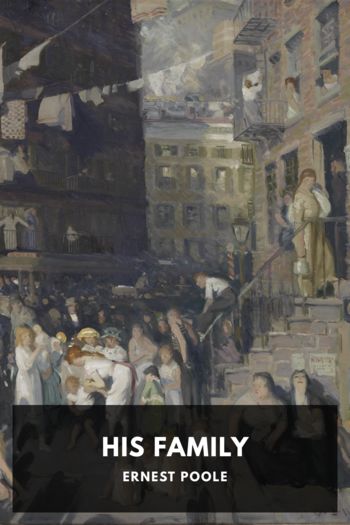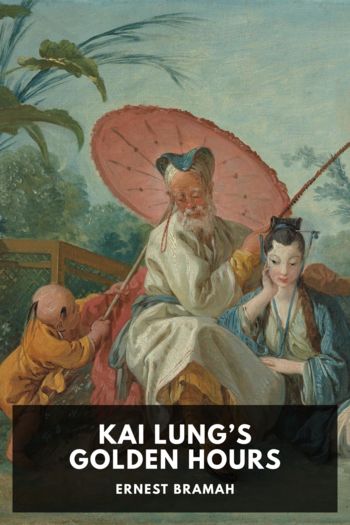His Family - Ernest Poole (ereader for comics .txt) 📗

- Author: Ernest Poole
Book online «His Family - Ernest Poole (ereader for comics .txt) 📗». Author Ernest Poole
“I don’t know,” said Roger huskily. He felt a tightening at his throat. Abruptly he turned to his grandson.
“George,” he asked, “what do you want to be?” The boy flushed under his freckles.
“I don’t know as I know. I’m thinking,” he answered very slowly.
“Talk it over with your mother, son.”
“Yes, sir,” came the prompt reply. “But he won’t,” reflected Roger.
“Or if you ever feel you want to, have a good long talk with me.”
“Yes, sir,” was the answer. Roger stood there waiting, then turned and walked slowly out of the barn. How these children grew up inside of themselves. Had boys always grown like that? Well, perhaps, but how strange it was. Always new lives, lives of their own, the old families scattering over the land. So the great life of the nation swept on. He kept noticing here deserted farms, and one afternoon in the deepening dusk he rode by a graveyard high up on a bare hillside. A horse and buggy were outside, and within he spied a lean young woman neatly dressed in a plain dark suit. With a lawn mower brought from home she was cutting the grass on her family lot. And she seemed to fit into the landscape. New England had grown very old.
Late one night toward the end of July, there came a loud honk from down the hill, then another and another. And as George in his pajamas came rushing from his bedroom shouting radiantly, “Gee! It’s dad!”—they heard the car thundering outside. Bruce had left New York at dawn and had made the run in a single day, three hundred and eleven miles. He was gray with dust all over and he was worn and hollow eyed, but his dark visage wore a look of solid satisfaction.
“I needed the trip to shake me down,” he pleaded, when Edith scolded him well for this terrific manner of starting his vacation. “I had to have it to cut me off from the job I left behind me. Now watch me settle down on this farm.”
But it appeared he could not settle down. For the first few days, in his motor, he was busy exploring the mountains. “We’ll make ’em look foolish. Eh, son?” he said. And with George, who mutely adored him, he ran all about them in a day. Genially he gave everyone rides. When he’d finished with the family, he took Dave Royce the farmer and his wife and children, and even both the hired men, for Bruce was an hospitable soul. But more than anyone else he took George. They spent hours working on the car, and at times when they came into the house begreased and blackened from their work, Edith reproved them like bad boys—but Deborah smiled contentedly.
But at the end of another week Bruce grew plainly restless, and despite his wife’s remonstrances made ready to return to town. When she spoke of his hay fever he bragged to her complacently of his newly discovered cure.
“Oh, bother your little blue bugs!” she cried.
“The bugs aren’t blue,” he explained to her, in a mild and patient voice that drove Edith nearly wild. “They’re so little they have no color at all. Poor friendly little devils—”
“Bruce!” his wife exploded.
“They’ve been almighty good to me. You ought to have heard my friend the Judge, the last night I was with him. He patted his bottle and said to me, ‘Bruce, my boy, with all these simple animals right here as our companions why be a damn fool and run off to the cows?’ And there’s a good deal in what he says. You ought to be mighty thankful, too, that my summer pleasures are so mild. If you could see what some chaps do—”
And Bruce started back for the city. George rode with him the first few miles, then left him and came trudging home. His spirits were exceedingly low.
As August drew toward a close, Deborah, too, showed signs of unrest. With ever growing frequency Roger felt her eagerness to return to her work in New York.
“You’re as bad as Bruce,” he growled at her. “You don’t have to be back,” he argued. “School doesn’t begin for nearly three weeks.”
“There’s the suffrage campaign,” she answered. He gave her a look of exasperation.
“Now what the devil has suffrage





Comments (0)